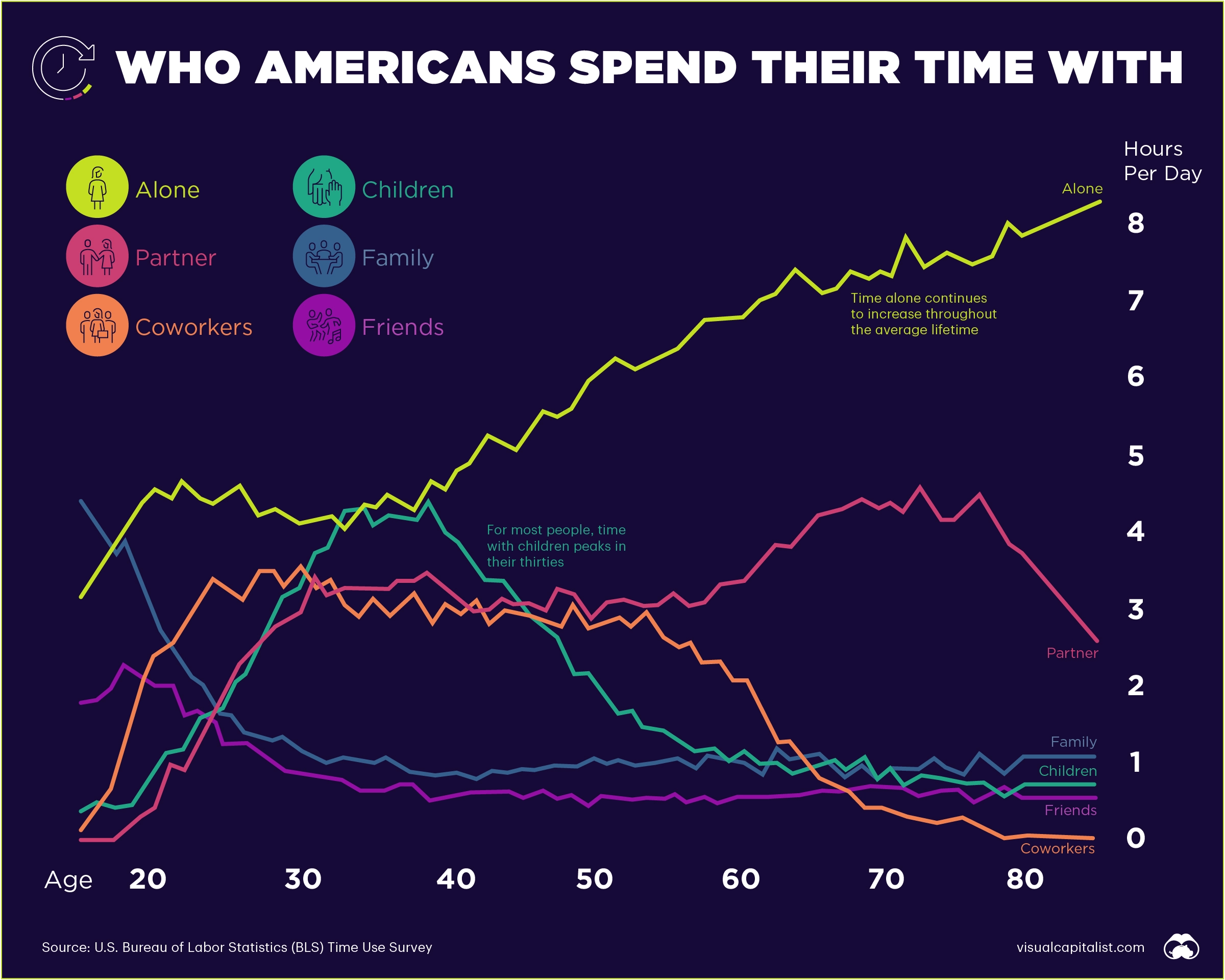Human beings are social animals thus they have always
depended on cooperation and social relationships to thrive. The time we spend
with others and the social connections that we make evolve throughout our
lifetime.
The insights from the American Time Use Survey and Our World
in Data, help us in looking deeper at who Americans spend most of their time
with at various ages of their life.
Adolescence to Adulthood
The time of an average American’s teenage years are spent alone
mostly or otherwise with their family. As majority of the under 18 population
lives with their nuclear family unit, which means parents and siblings. Not surprisingly,
adolescence is the same period when time spent with friends reaches its peak.
Moving on to the period of early adulthood, at 25 years of
age, an average of 275 minutes per day is spent alone, and 199 minutes is spent
with the coworkers. This aligns with people in their twenties beginning to
enter the workforce.
By the age of 35 years, time spent alone is still the
highest, approximately 263 minutes per day. However, time spent with children
and partners combined, the runner-ups, add up to 450 minutes or around 7.5
hours a day.
The table below gives a better overview of the time spent
from 15 to 35 years of age.
|
Age |
Most Time Spent |
Second |
Third |
|
15 years |
Family - 267 Minutes |
Alone - 193 Minutes |
Friends - 109 Minutes |
|
25 years |
Alone - 275 Minutes |
Coworkers - 199 Minutes |
Partner - 121 Minutes |
|
35 years |
Alone - 263 Minutes |
Children - 249 Minutes |
Partner - 198 Minutes |
Although people spend most of the time with their kids and partners as they grow older, this trend tends to shift. The main reason behind it is that women nowadays are having fewer children. Their mindset has changed and they are more inclined towards getting an education and entering the workforce. This causes them to delay having children or some even opt for not having children at all.
Middle to Old Age
Upon turning 45, the average person spends 309 minutes a day
alone, and in second place, 199 minutes with children. Time with coworkers
remains relatively steady throughout someone’s forties, which corresponds with
the middle of career for most people in the workforce.
By age 55, time spent alone still takes first place, but
time spent with a partner goes up to 184 minutes, and time with coworkers also
moves up, pushing out time spent with children.
|
Age |
Most Time Spent |
Second |
Third |
|
45 |
Alone - 309 Minutes |
Children - 199 Minutes |
Partner - 184 Minutes |
|
55 |
Alone - 384 Minutes |
Partner - 184 Minutes |
Coworkers - 163 Minutes |
|
65 |
Alone - 444 Minutes |
Partner - 243 Minutes |
Family - 65 Minutes |
|
75 |
Alone - 463 Minutes |
Partner - 253 Minutes |
Family - 56 Minutes |
Typically, time spent with children during the mid-fifties
tends to see a sharp decline as children enter adulthood and begin to move out
or spend more time out of the house.
Today, more children are staying at home longer or even
moving back home. 52% of adult children in the U.S. today are living with their
parents.
As people get older, at around 65 years of age, they spend
less time with their coworkers as they are near to retirement and spend much
time alone or with a spouse. Then, from age 65-75, people consistently spend
the most time alone, then with a partner and family.
Alone and Lonely?
As one grows older the time spent alone reaches to the highest
level. 463 minutes at 75 years and it goes up to 477 minutes at 80 years of
age. This is a problem as elderly people are left without resources r social
connections.
Also, while one quarter of elderly Americans live alone, the
trend of solo living is going up across nearly every age group, and this trend
applies to a number of mature economies around the world.
Although, increasing alone time has negative impacts on
people, but being alone does not necessarily link to loneliness. The World in
Data found that there was no direct correlation between living alone and
reported feelings of loneliness.
The role of technology is also important to consider. Time spent
alone does not equal to isolation, all thanks to the smartphones and social media.
Infographic by: visualcapitalist


